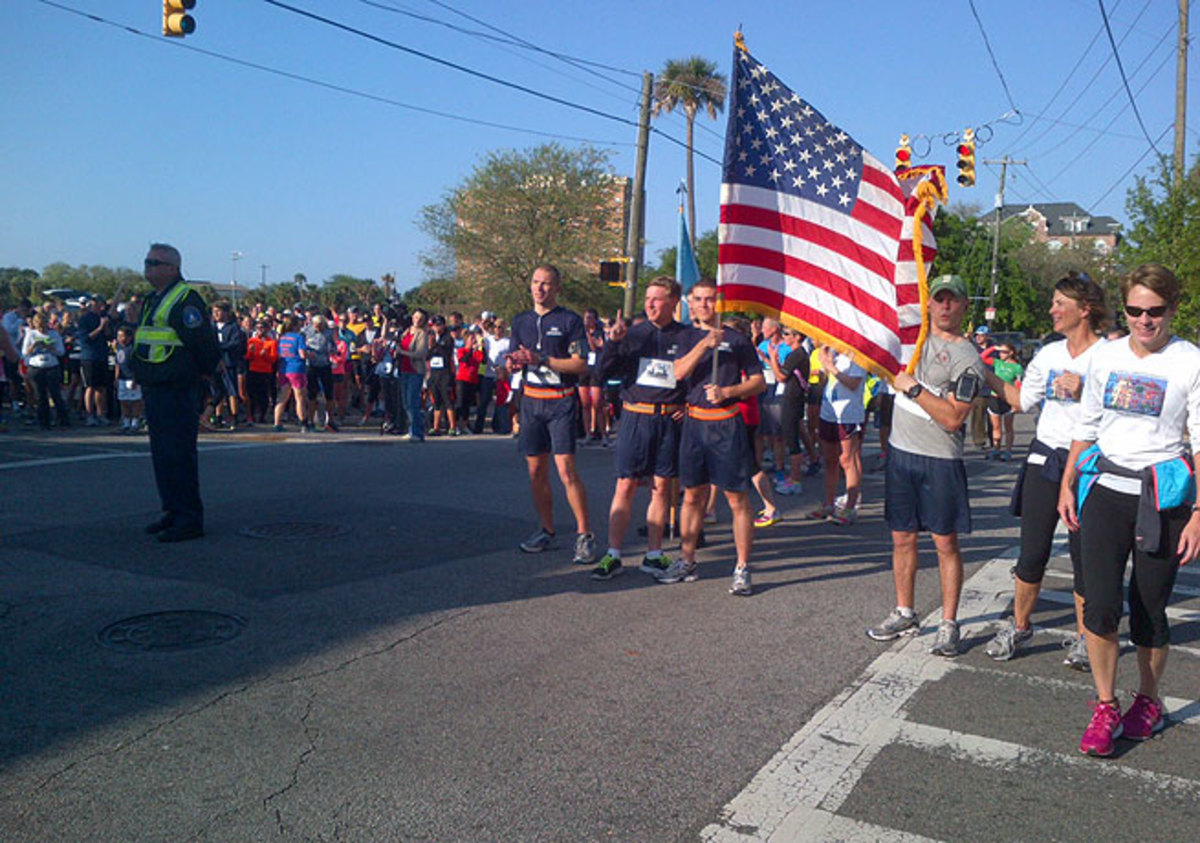Running not against the clock, but instead for solidarity


CHARLESTON, S.C. -- There was no marathon here on this Sunday, a blue and nippy spring morning. There wasn't, we were reminded on the start line, even a race. All there was was a three-mile group run, assembled hastily by way of Twitter, Facebook, word of mouth, TV news, the local paper.
Charleston is a running town, and you'll often see little knots of runners here: five, eight, 10 people, often from the local colleges or city's medical community. The Sunday community group run drew at least 1000 people, maybe more like 1,500.
All around me were Boston Marathon jerseys and Red Sox jerseys bearing the names Ortiz and Varitek and Garciaparra. Some wore green T-shirts. The course over colonial streets had no mile-markers or water stations. We had no running chips in our laces. The police presence was modest.
Before we began, there was a 26-second moment of silent meditation. I thought of a close friend's brother, a Boston lawyer taking in the finish-line sights on a break from work. He was among the injured. John's civilized life collided with the blind rage of hatred. Doctors will work their magic, but a crude bomb detonated by a lost soul has changed his life forever.
The community of American runners, to generalize, is educated, and you could say that hatred's natural foe is an educated populace. King, anyhow, believed that. I'd be pleased to throw my lot in with the community of American runners. I'm way in the rear of the pack but it doesn't really matter, especially at the starting line.
That's true at the Boston Marathon and the London Marathon. It was true in the Charleston run. It will be true next month in Philadelphia, at the 10-mile Broad Street run. It's true whenever runners gather, certainly for themselves but also, always, in the name of community, too. How many of these runs are fundraisers for this good cause or that? Thousands of them.
The Charleston runners gathered on the tip of the city's peninsula, surrounded by a brackish bay. It's a beautiful town, where I happened to find myself between an assignment in Hilton Head and another in Savannah, sometimes called Holy City for its many historic churches and synagogues. It is, to a significant degree, a city of haves and have-nots, and the Sunday morning run went by mansions, student apartments and subsidized housing. We also went by monuments to different wars, including the one that used to be taught locally as The War of Northern Aggression.
There's a natural chasm between Boston and Charleston, if you take a long historical view. But nobody was taking a long historical view Sunday morning. Everybody was thinking about the Hub (as in, "of the Universe") and forgetting for now the city's superiority complex. (You can draw a line from the Adams family to Bill Belichick, if you're so inclined.) We were all honorary, deputized Bostonians for the morning. Maybe it can last.
The spirited connection a runner feels in the throng of these big communal races is a cousin to what we felt as a nation in the wake of the Sept. 11 attacks. Come together. We are family. Spirits in the night. The great songbook of 20th-century pop can't help but race through our collective minds, or at least that's what I find. If we can make the spirit endure, that's up to us.
There was no singing of the National Anthem before the race. Maybe the organizer, Adrienne Levy, a 27-year-old Charlestonian, knew we didn't need such an obvious nod to patriotism. The outbursts of connection were more spontaneous. The fastest runners waited for the middle-packers and the runners in the middle, along with their faster siblings, waited for the back of the pack to come in. Nobody, it seemed, made a move for the exit until the last runners finished. Accompanying the final runners were kids from the Citadel, carrying an American flag, greeted by rhythmic clapping that grew faster and faster. They were welcomed with a simple chant: BOS-ton, BOS-ton, BOS-ton.
"We'll run about three miles then we are going to pretend it is like coming up to the finish line of the Boston Marathon," Levy told a local TV station a couple days ago. "We are going to finish those last few miles for the people who didn't get to see their dream become a reality."
I don't know if I ran my best race ever. I had, most typically, a stopwatch malfunction halfway through the run, and nobody really knows if it was three miles or more or less and nobody cared. I can tell you I was thinking of John, and many others, the names we know from the news and the many others whose names we don't. I was thinking of the beauty of sport and the frailty of life and the power of community. Come together. I can tell you that I ran my hardest, and that I was not alone.
There were no trophies, of course. Just water and doughnuts. Water and doughnuts and the privilege of running together. Is this a great country or what?
